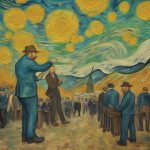
Housing Bubble 2008: A Journey Through Financial Chaos
June 25, 2024
The 2008 Housing Bubble crisis is a stark reminder of the fragility of financial systems and the profound impact of human psychology on economic outcomes. As we revisit this tumultuous period, we find ourselves navigating a complex web of factors that led to one of the most significant economic downturns since the Great Depression. Today, we will dissect the crisis through the lenses of Crowd psychology, technical analysis, cognitive bias, and evolutionary psychology while weaving in the wisdom of historical figures to shed light on the human condition that perpetuates such cycles.
The Seeds of Destruction
As Confucius once said, “The strength of a nation derives from the home’s integrity.” Ironically, the very concept of home ownership became the Achilles’ heel of the American economy. A perfect storm of easy credit, lax lending standards, and a collective belief in the ever-increasing value of real estate fueled the housing bubble that inflated throughout the early 2000s.
Charlie Munger, Warren Buffett’s long-time partner, often speaks of the “lollapalooza effect” – the confluence of multiple biases and tendencies that lead to extreme outcomes. The housing bubble was a prime example of this effect in action. Cognitive biases such as herding behaviour and confirmation bias led homebuyers and lenders to ignore warning signs and feed the bubble.
From an evolutionary psychology perspective, humans are hardwired to seek safety and security. The idea of homeownership taps into this primal desire, creating an emotional attachment that can override rational decision-making. As Mark Twain humorously noted, “It ain’t what you don’t know that gets you into trouble. It’s what you know for sure that just ain’t so.” This aptly describes the certainty that housing prices would continue to rise indefinitely.
The Role of Mass Psychology
Mass psychology was crucial in the housing bubble’s inflation and bursting. Former Federal Reserve Chairman Alan Greenspan coined the concept of “irrational exuberance,” which perfectly encapsulates the collective mindset that drove the market to unsustainable heights.
In his seminal work “The Prince,” Machiavelli observed that “Men are so simple and so much inclined to obey immediate needs that a deceiver will never lack victims for his deceptions.” This insight is particularly relevant when examining the subprime mortgage crisis. Lenders, driven by short-term profits, deceived borrowers with complex financial products, while borrowers, blinded by the dream of homeownership, willingly accepted loans they couldn’t afford.
The Medici family, known for their financial acumen in Renaissance Italy, understood the importance of diversification and risk management. However, modern economic institutions have forgotten these fundamental principles, concentrating their risks on mortgage-backed securities and collateralized debt obligations.
Technical Analysis: The Writing on the Wall
While mass psychology explains the emotional drivers of the crisis, technical analysis provides insight into the market dynamics that preceded the crash. The housing market showed classic signs of a bubble, with prices detaching from fundamental values and rising at an unsustainable rate.
Key indicators such as the price-to-income ratio and the price-to-rent ratio reached historic highs, signalling overvaluation in the housing market. However, as is often the case in bubbles, market participants caught up in the euphoria largely ignored or rationalized away these warning signs.
The Aftermath and Recovery
The housing market experienced a severe correction in the wake of the crisis. Home prices plummeted, foreclosures skyrocketed, and the broader economy entered a deep recession. The recovery process has been slow and uneven, with various government interventions stabilising the market and supporting homeowners.
However, as the data suggests, the recovery may be more fragile than it appears on the surface. The rise in pending home sales and housing affordability in the current market may create a false sense of security. As Lawrence Yun, chief economist for the National Association of Realtors, notes, “Because housing is so affordable in today’s market, job security and the first-time buyer tax credit are bigger factors in influencing home sales.”
Yet, this optimism must be tempered with caution. The underlying economic fundamentals, such as high unemployment rates, stagnant wages, and increasing national debt, pose significant challenges to a sustainable recovery in the housing market.
Lessons from History and Philosophy
The housing crisis of 2008 is not without historical precedent. As the philosopher George Santayana famously stated, “Those who cannot remember the past are condemned to repeat it.” The tulip mania of the 17th century, the South Sea Bubble of the 18th century, and the stock market crash of 1929 all share similar patterns of irrational exuberance followed by devastating crashes.
Confucius emphasized the importance of learning from history: “Study the past if you would define the future.” By examining the patterns of past bubbles and crashes, we can better understand the cyclical nature of financial markets and perhaps develop strategies to mitigate their impact.
The Role of Government and Monetary Policy
The government and Federal Reserve’s responses to the crisis have been subjects of intense debate. The massive bailouts of financial institutions and the implementation of quantitative easing have had far-reaching consequences for the economy.
In their efforts to prevent a complete economic collapse, Machiavelli’s advice that “the end justifies the means” seems to have been adopted by policymakers. However, these actions have led to unintended consequences, such as the national debt ballooning and potential long-term inflationary pressures.
The Future Outlook
As we look to the future, several factors suggest that caution is warranted in the housing market:
1. The national debt continues to grow at an alarming rate, potentially leading to higher interest rates in the future.
2. The job market remains weak, with high unemployment and underemployment rates.
3. The Federal Reserve’s unprecedented monetary policies may have created new bubbles in other asset classes.
4. International buyers, who played a significant role in supporting the U.S. real estate market, have shown declining interest due to the global recession.
Charlie Munger’s advice to “invert, always invert” is particularly relevant here. By considering what could go wrong rather than focusing solely on optimistic scenarios, investors and policymakers can better prepare for potential challenges.
Conclusion
The 2008 Housing Bubble crisis powerfully reminds us of the complex interplay between human psychology, economic forces, and policy decisions. As we revisit this period of “hell and brimstone,” we must recognize that the seeds of the next crisis may already be sown in the measures taken to address the last one.
Mark Twain’s observation that “History doesn’t repeat itself, but it often rhymes” is a fitting conclusion. While the specific circumstances of the next financial crisis may differ, the underlying human tendencies that drive boom-and-bust cycles remain constant.
As we progress, we must remain vigilant, question our assumptions, and strive for a deeper understanding of the economic forces shaping our world. We hope to navigate the uncertain waters of the future financial landscape by learning from the past and maintaining a clear-eyed view of the present.
In Confucius’s words, “Real knowledge is to know the extent of one’s ignorance.” Perhaps the most important lesson from the 2008 Housing Bubble is the need for humility in complex economic systems and the recognition that our understanding is always incomplete. With prudent decision-making and robust risk management, this awareness may be our best defence against future financial calamities.
One pound of learning requires ten pounds of common sense to apply it.
Persian Proverbs – Sayings of Persian Origin
Other Articles of Interest










